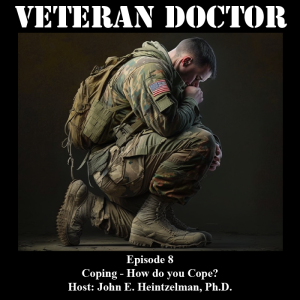
Good Morning Veterans, Family, and Friends, welcome back to the EIGHTH EPISODE of the Veteran Doctor. On this week's podcast, we will discuss Coping. How do you Cope?. We will also continue our fun facts of UBI (Useful Bits of Information) and Veteran News, so stick around for some great stuff!
As Veterans, we all have some kind of traumatic event that we have had to deal with in our lives. How we deal, or cope, with this trauma is key to our success, or failure, in our daily routines. There are many different ways to cope with these traumas. I want to share many different people’s approaches to coping with trauma and give different perspectives and techniques in how these different ways mitigate stress in their lives.
Maintain a Healthy Lifestyle and Exercise
All veterans who have had high-stress jobs can benefit from basic stress-reduction techniques. To help reduce stress, there are basic daily things that can be done to help mitigate the effects of stress:
- Exercise regularly. Cardio and strength training reduces stress levels and keeps your mission ready.
- Get good sleep. Poor sleep or not enough sleep has a significant negative impact on wellbeing.
- Eat healthy. A good diet helps keep your body and mind in shape.
- Participate in relaxing activities. Breathing-based meditation and yoga, for example, can improve symptoms and reduce anxiety.
- Stay connected. The support of friends and family improves psychological health when facing stress.
- Get outside! Do not become a hermit and stay inside.
Socialize
Communication is key to anything, relationships, problems, work, friendships, and stress. Talk to others when stress becomes too high. The more you talk about your stress with people your trust, the most you get off your chest and find solutions to resolve your issue. You will also find that other people are experiencing similar problems in the world and you are not alone. If you feel that you have no one to talk to, there is always the VA crisis hotline, which is strictly anonymous, 1-800-273-8255. This is a great resource to talk to people about anything in a time of need.
Hobbies
Hobbies have the potential of bringing pleasure into our lives. Hobbies provide an outlet from daily stressors that can keep us from getting burned out in our jobs. They also offer numerous health benefits, from lower blood pressure to better physical function, higher positive psychological states, and less memory loss. Further, hobbies may improve our work performance if they improve our decision-making skills, creativity, and confidence. Taking up a hobby to relax and keep your brain focused provides additional skillsets to enhance future performance. Many hobbies can include Reading, Gardening, Shooting, Models, Woodworking, Cars, Motorcycles, Fishing, Photography, etc. Hobbies also have a social aspect to them by sharing your interests with others with shared pursuits. These social interactions can provide a degree of social support we may need.
Video Games
In recent wars, research has shown that the younger generation has used video games as a self-directed coping strategy to manage their physical and psychological stressors. This research found that gamers used video games to cope with challenges associated with their military service. Their coping mechanisms included escapism, managing self-diagnosed physical and/or psychological ailments, seeking social support (mainly multiplayer online games), and connecting with civilian life. Those who used video games to cope tended to have served longer, and they reported high escape, fantasy, and skill-development motivations for gameplay. While their favorite game genre was fantasy, military-themed games were a close second. Many of the favorite games involved the military through storylines, gameplay mechanics, or avatar tendencies. While video games were described as vehicles for escape and stress relief, avatars appear to be specific, though uncommon, vehicles for coping related to military identity. Avatars helped gamers negotiate their legitimacy and efficacy, notably after they returned to civilian life.
Education
Going to school, no matter what the age, gives you the ability to further your education and stimulate those brain cells in your head. It also allows you to educate yourself on anything you do not understand about your injuries or stress. I find that furthering my education has allowed me to control the effects of my PTSD and TBI by understanding my injuries and applying the concepts I have learned to the symptoms I am experiencing. Sort of self-treating myself. Many of my friends who are Psychologists have asked me to help them with some of their clients (who are veterans) because these veterans did not trust their doctors due to a lack of trust. They did not trust the Psychologist because the veteran did not feel the Psychologist did not understand what the veteran had been through since they had never served in the military. That is why I was brought into the picture I have. My education, combat experience, injuries, and education all make it easy for me to relate to the patient. This is why knowledge is essential for everyone to have when it comes to keeping the brain engaged. The old saying “you can’t teach an old dog new tricks” is not valid. You can!
All of these things are only suggestions. There are many other healthy things out there that are both mental and physically stimulating. You may be already engaging in these activities. Good for you! If you are not, then start today. Start slowly and progressively increase, so you do not overexert yourself. These activities are meant to be fun and relaxing.
More Episodes
 2023-05-06
2023-05-06
 188
188
 2023-05-06
2023-05-06
 11
11
 2023-04-15
2023-04-15
 19
19
 2023-04-15
2023-04-15
 11
11
 2021-11-19
2021-11-19
 70
70
 2021-06-25
2021-06-25
 63
63
 2021-06-06
2021-06-06
 25
25
 2021-06-05
2021-06-05
 32
32
 2021-05-02
2021-05-02
 42
42
Create your
podcast in
minutes
- Full-featured podcast site
- Unlimited storage and bandwidth
- Comprehensive podcast stats
- Distribute to Apple Podcasts, Spotify, and more
- Make money with your podcast
It is Free
- Privacy Policy
- Cookie Policy
- Terms of Use
- Consent Preferences
- Copyright © 2015-2024 Podbean.com






